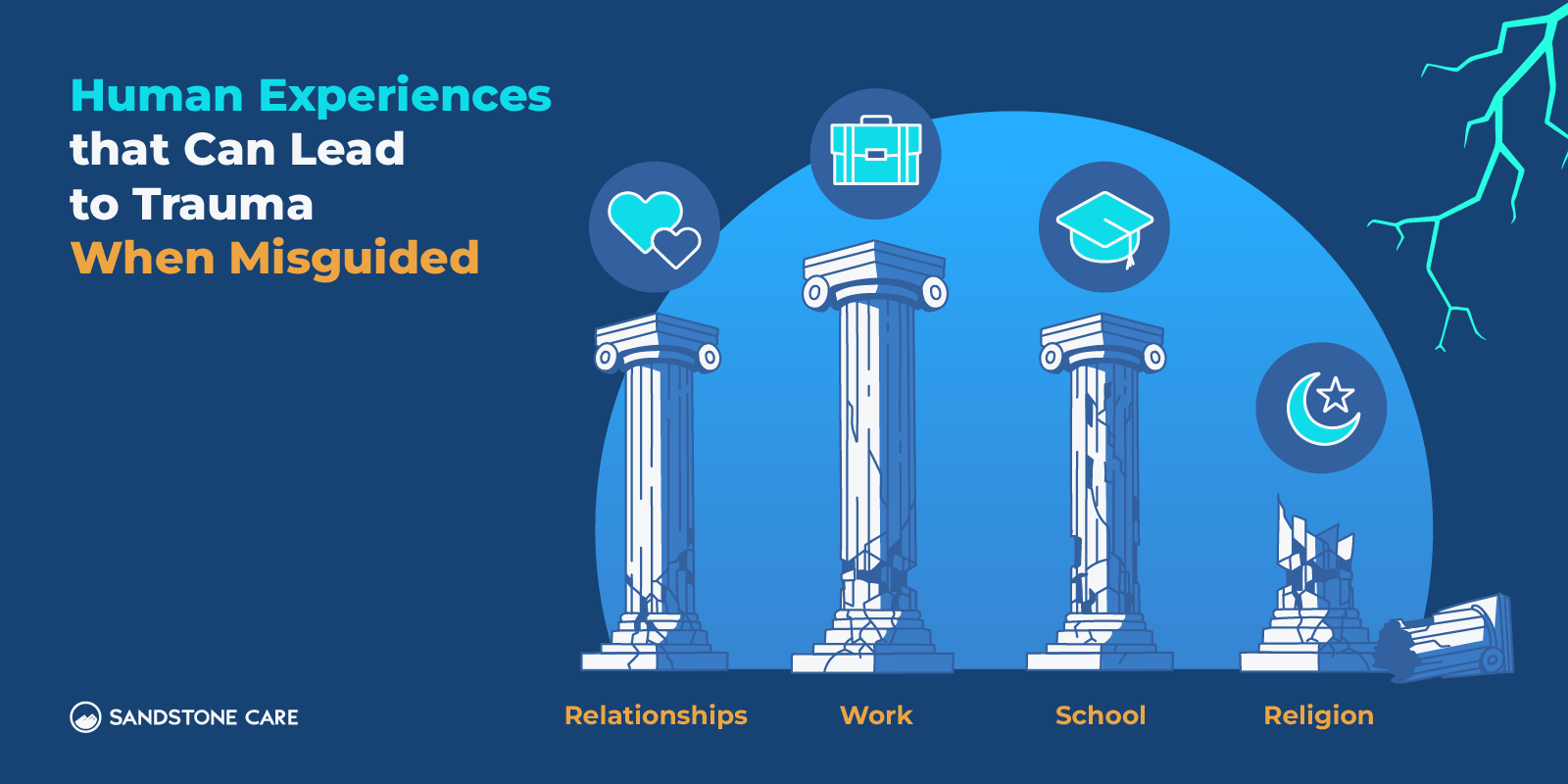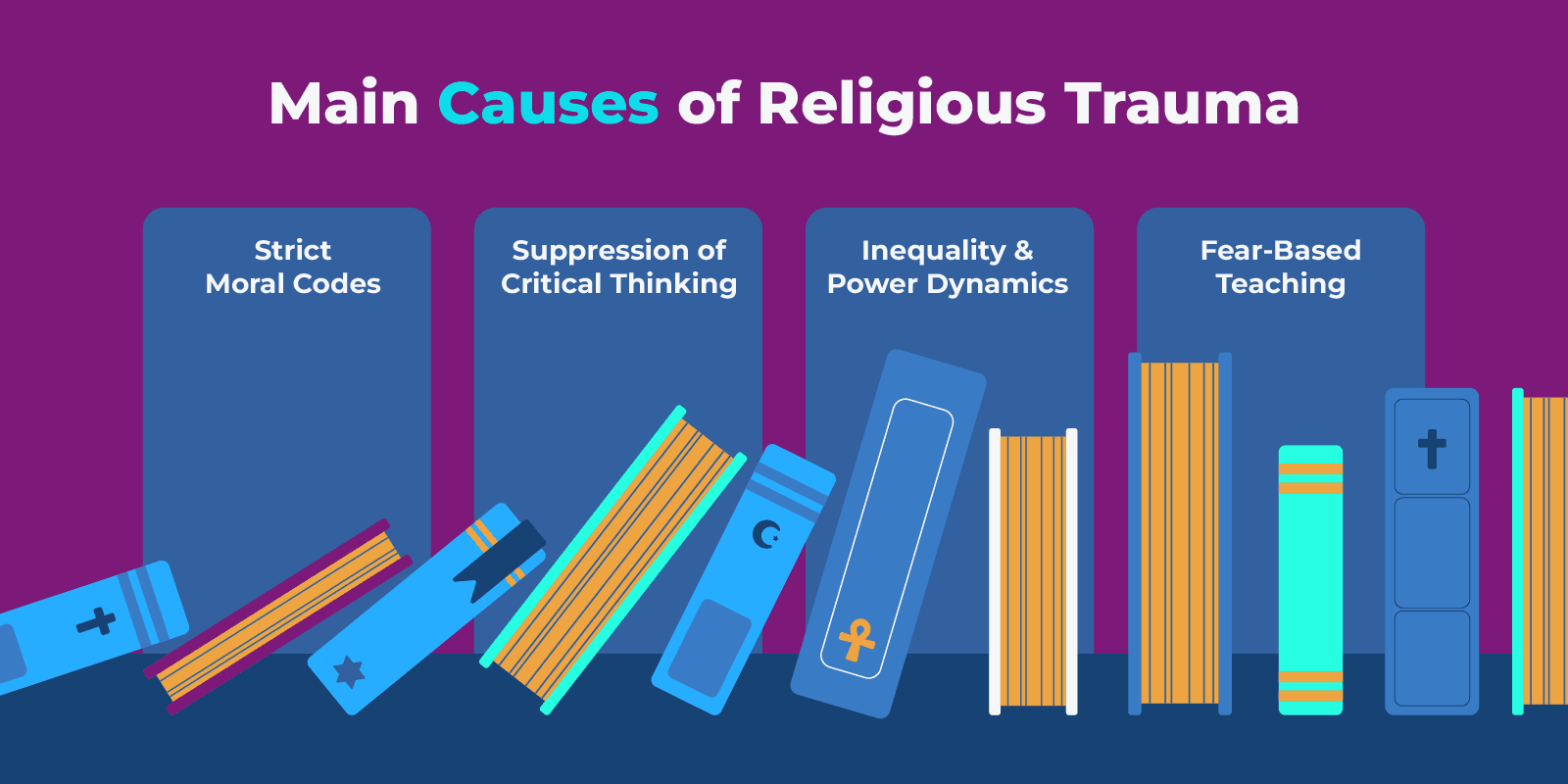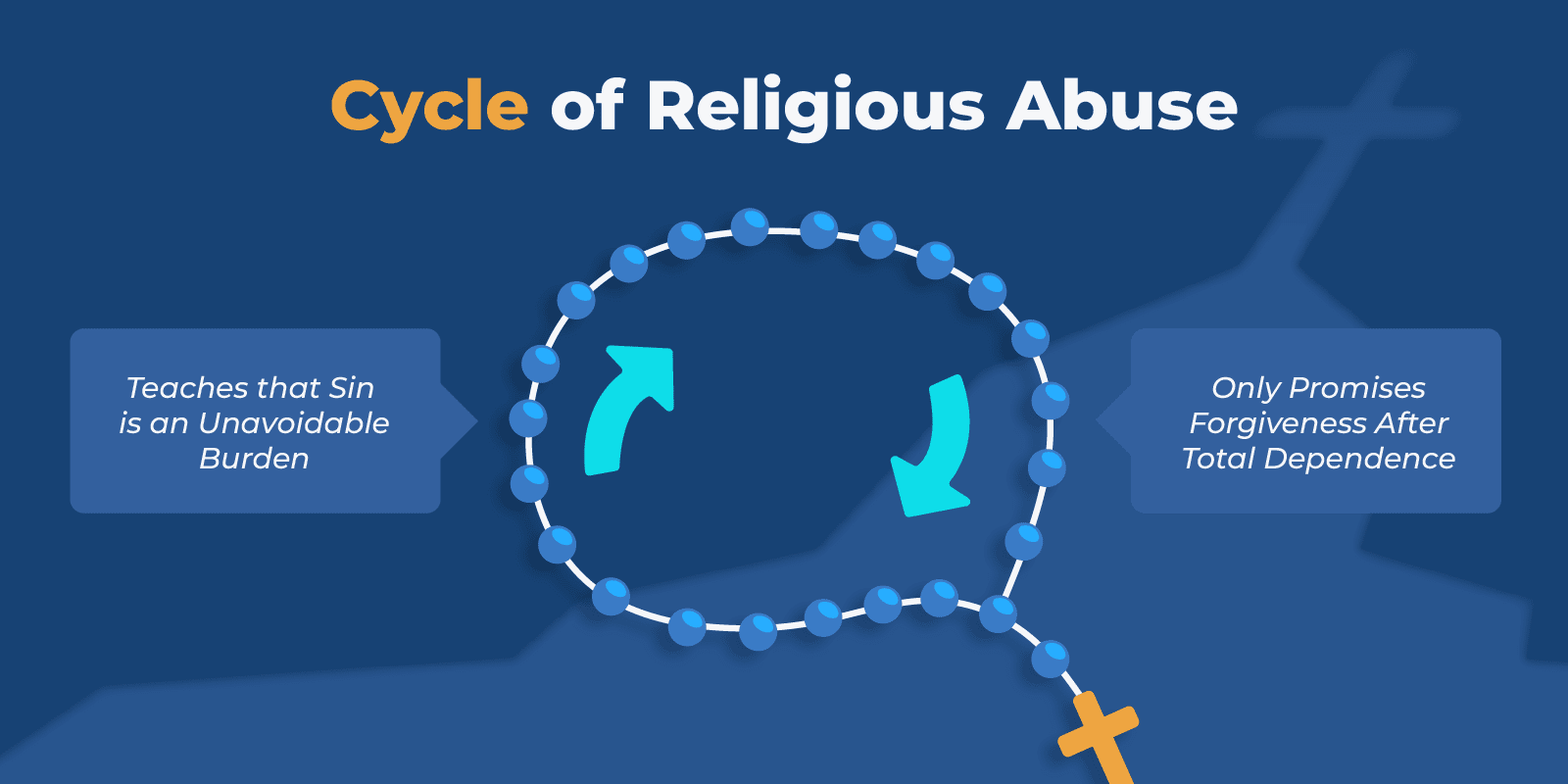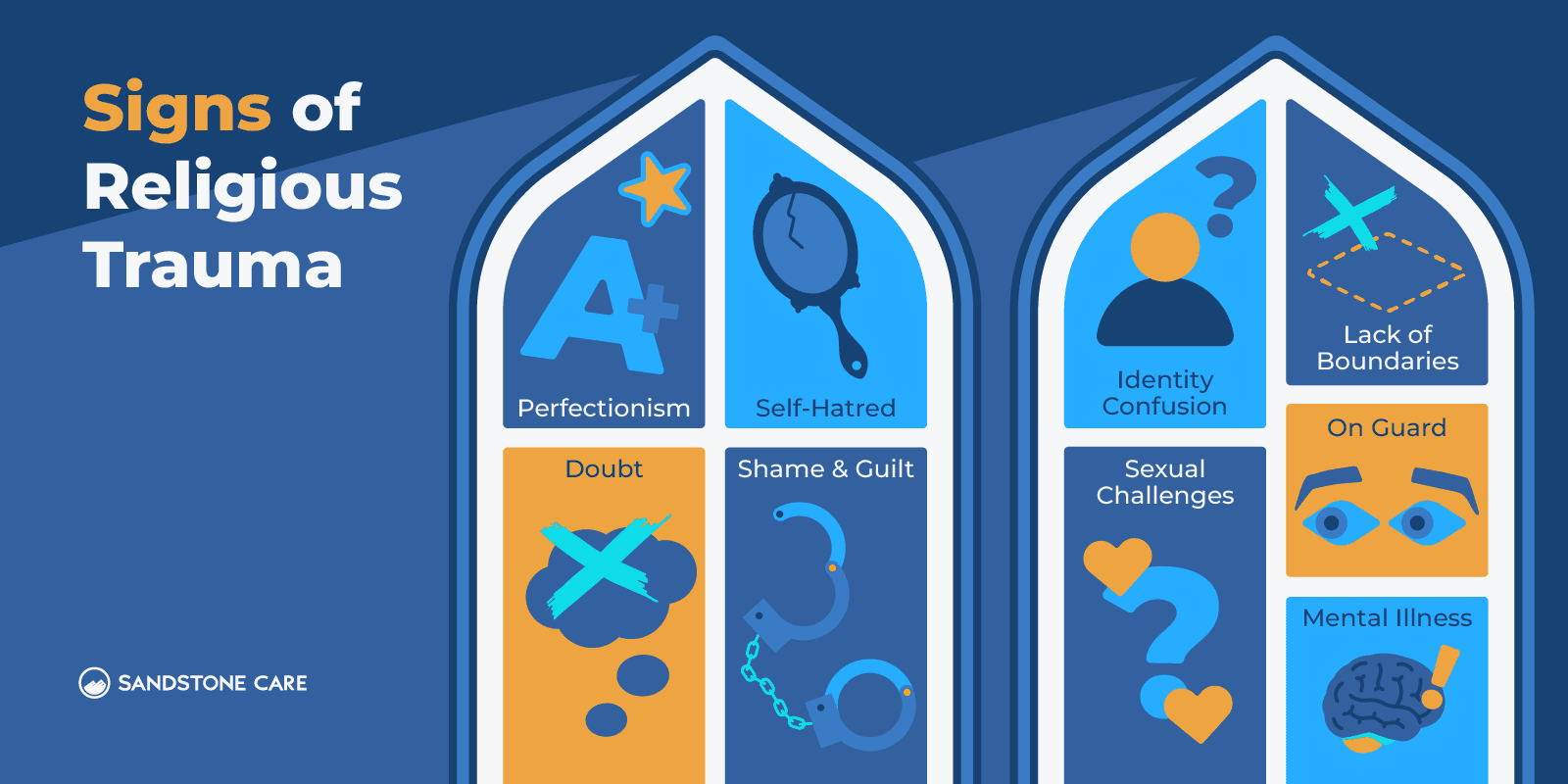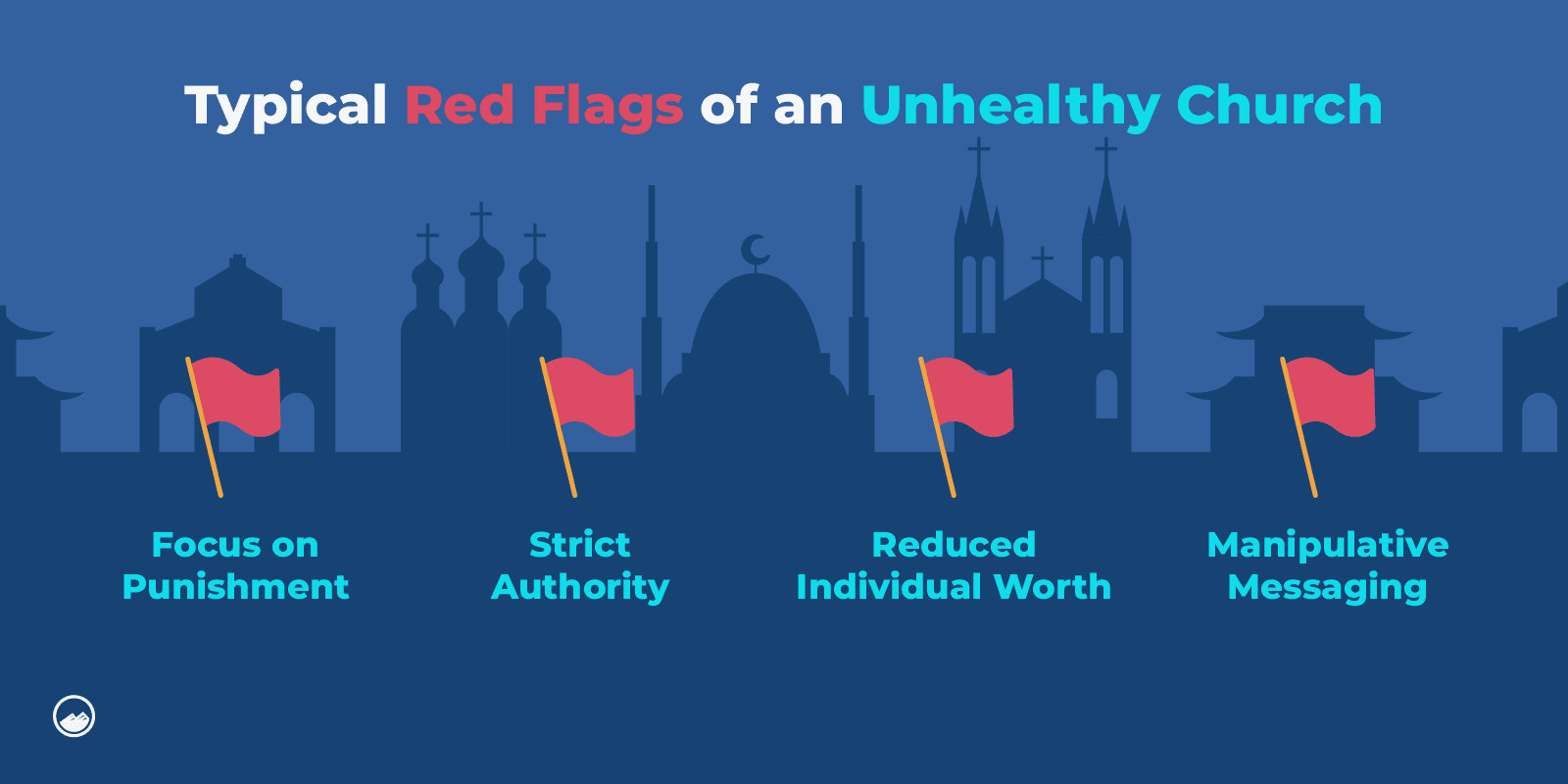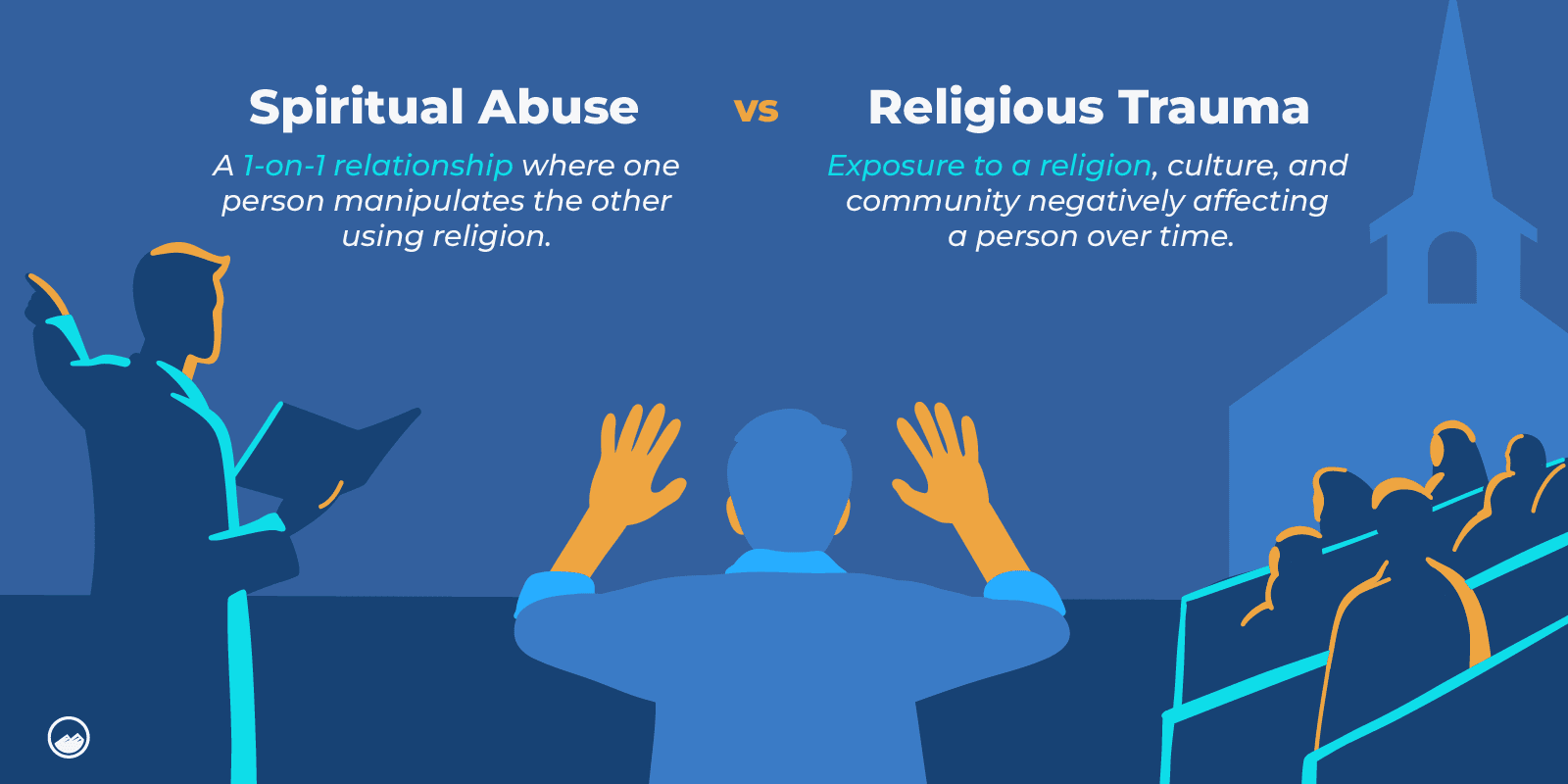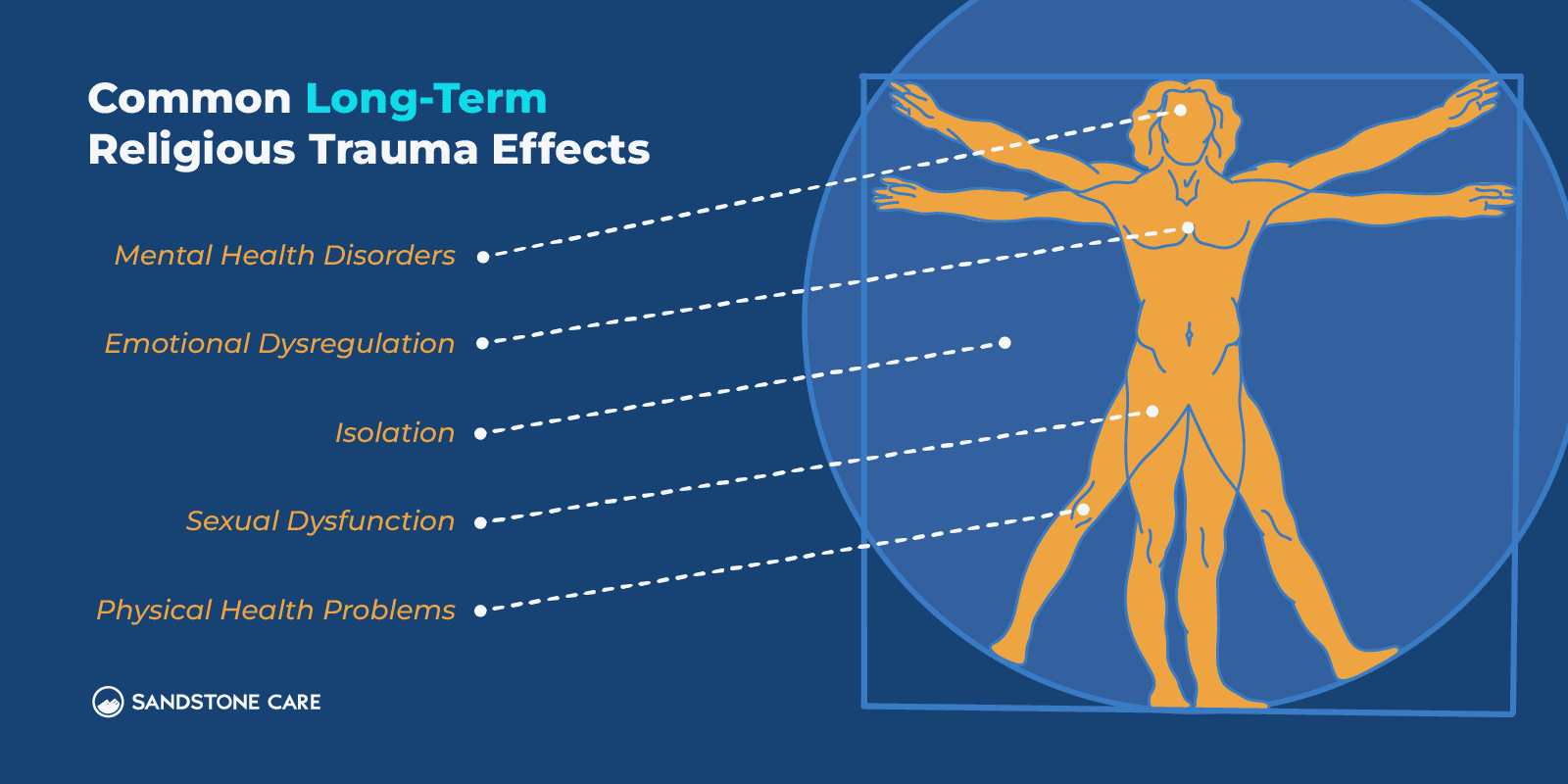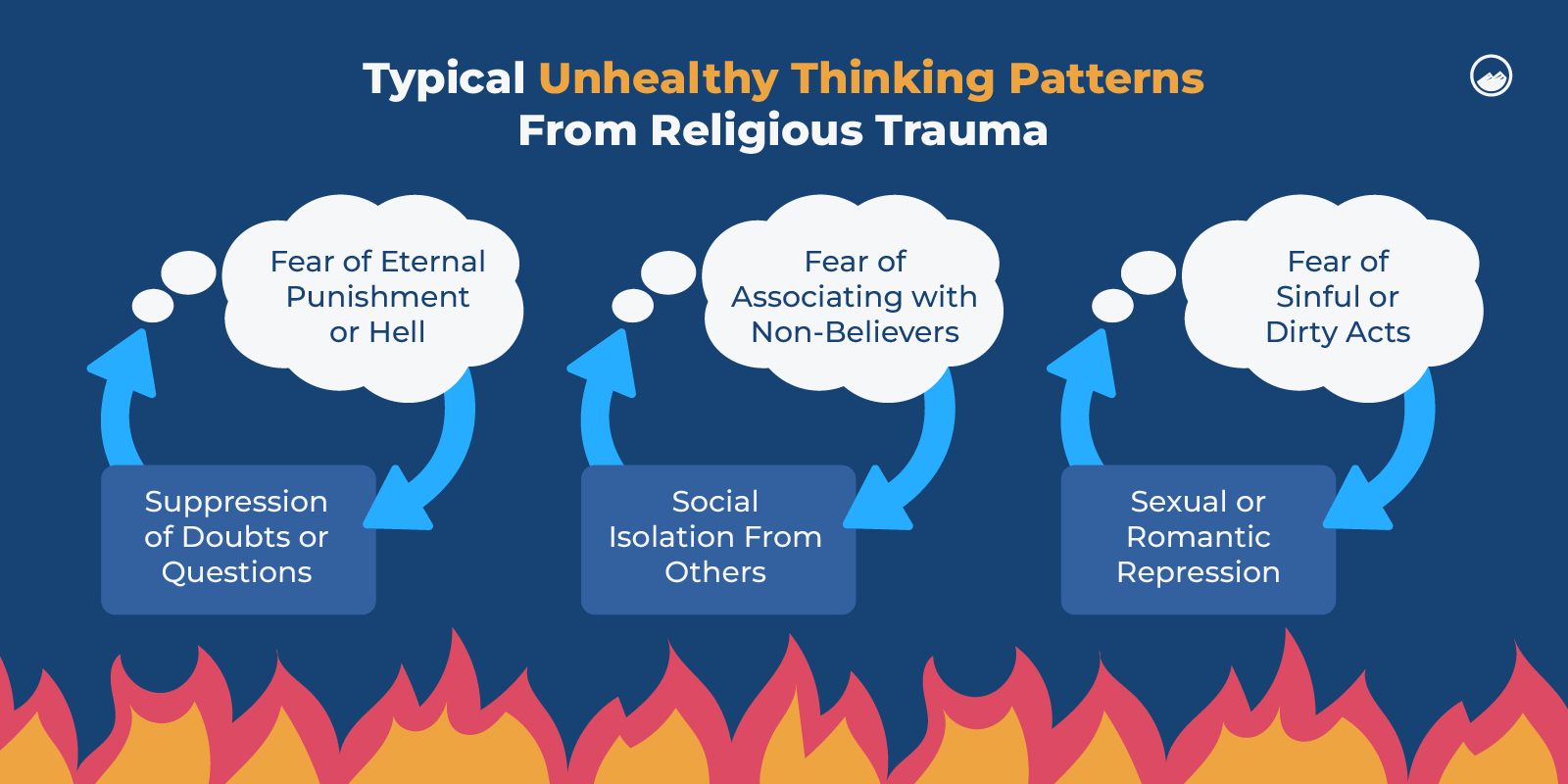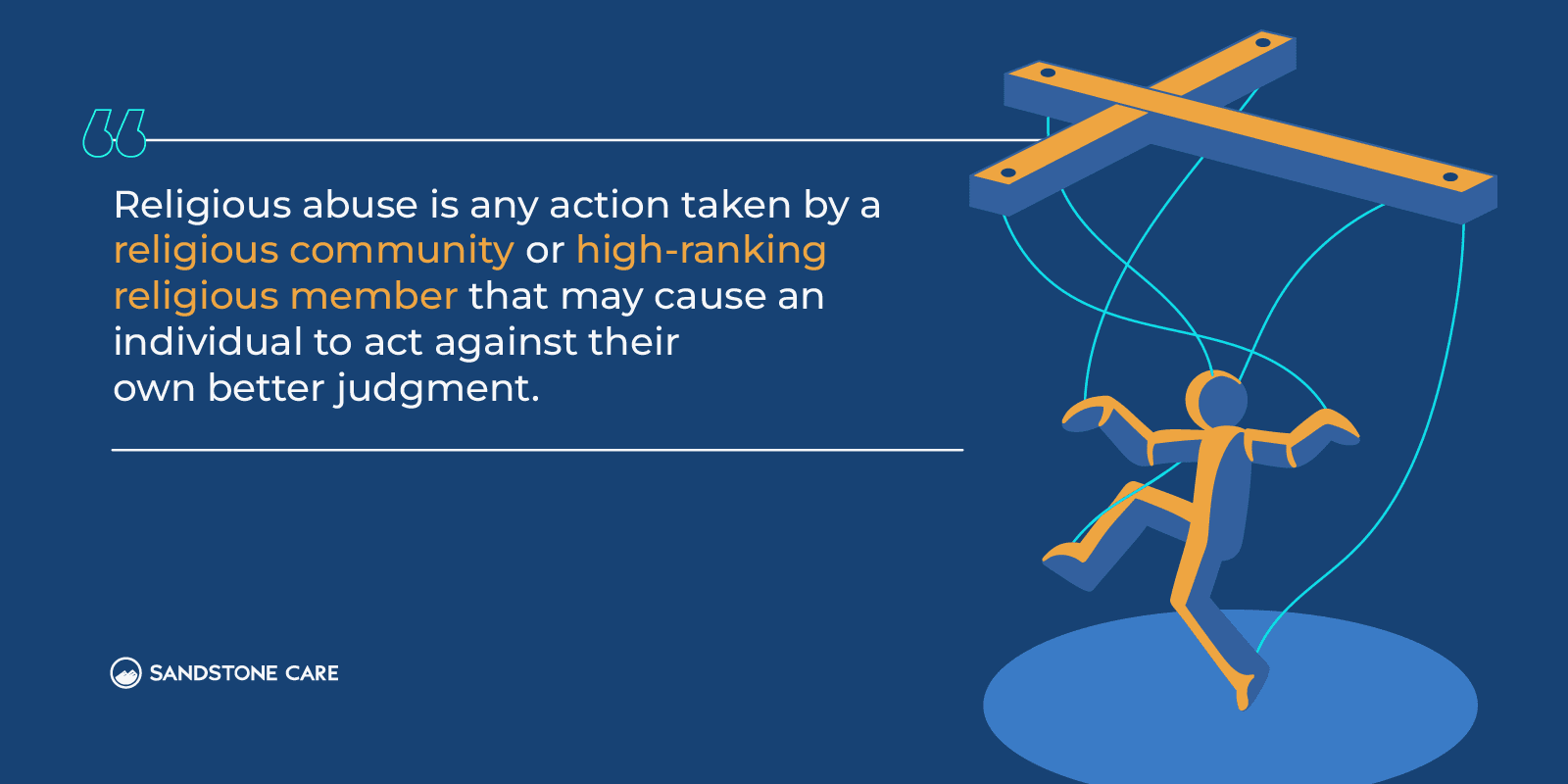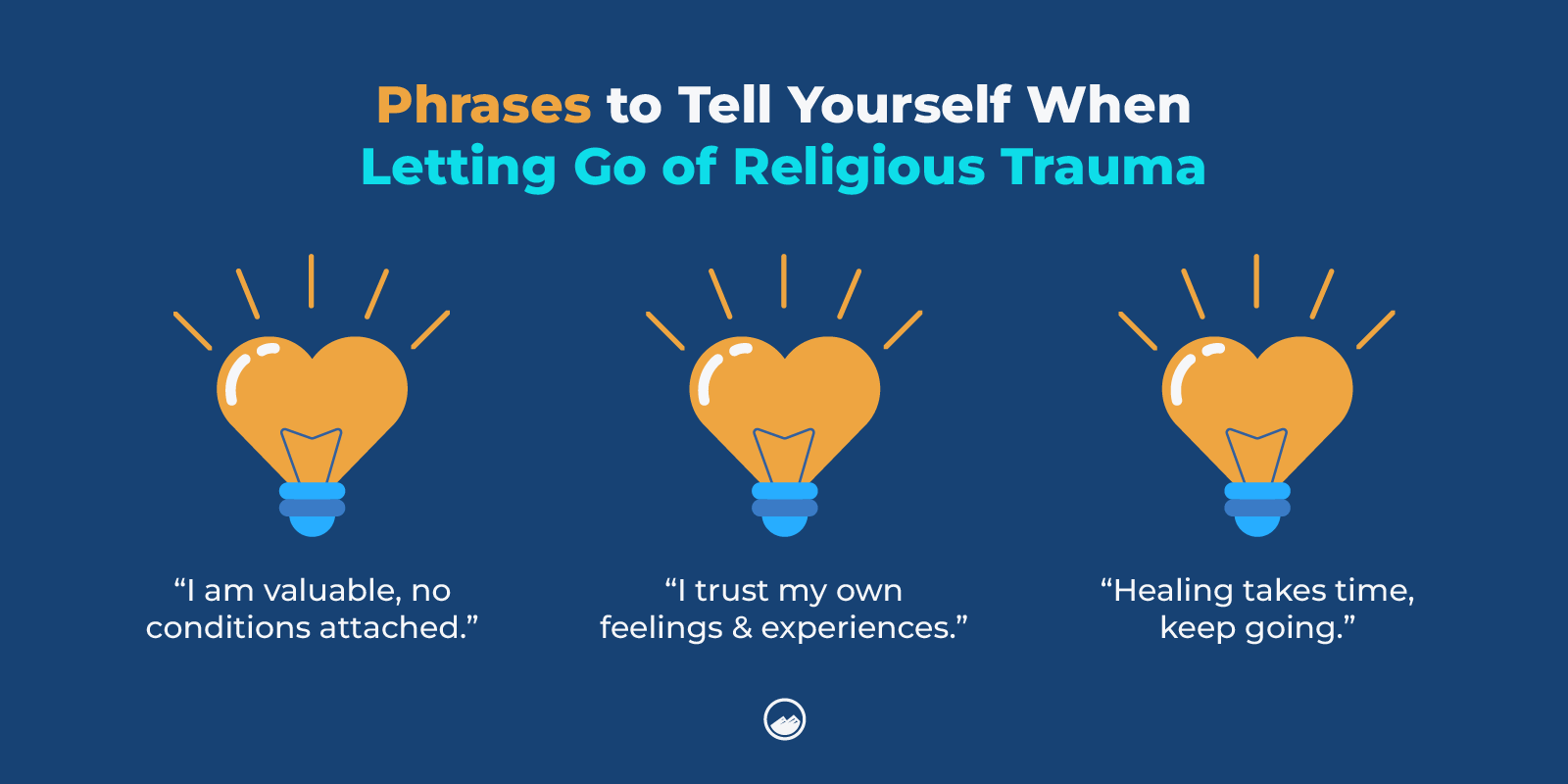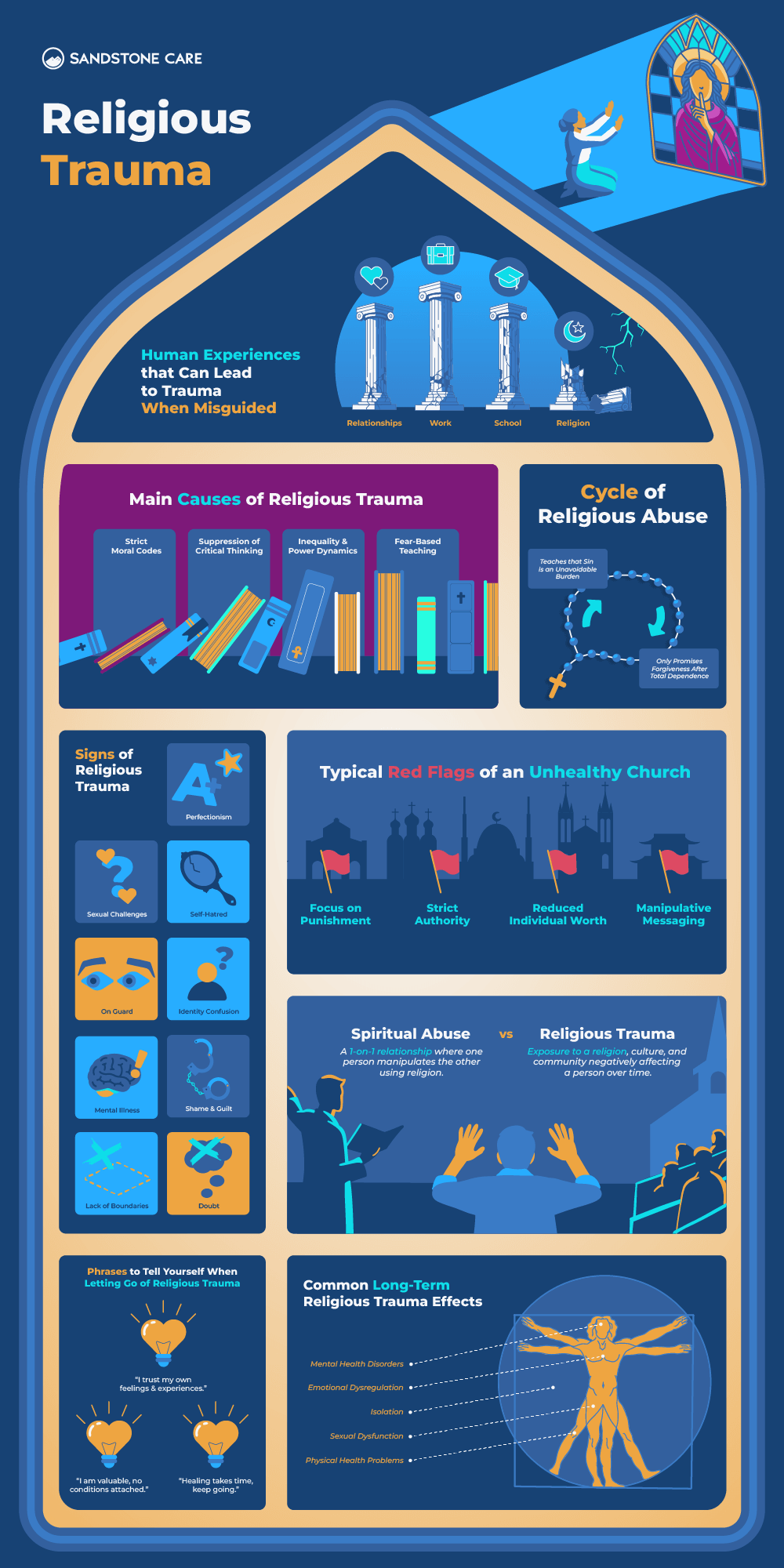What Is Religious Trauma?
Religious trauma is any trauma that takes place in a religious setting, often through psychological or emotional distress or emotionally manipulative practices.
Religion can play an essential role in a person’s life, and many may find incredible fulfillment in exploring their religious beliefs and practices. Many may also utilize these spiritual beliefs and communities for personal healing.
However, others experience negative religious experiences that can create religious trauma.
What Causes Religious Trauma?
Religious trauma occurs when a religious official or religious community uses a person’s spiritual beliefs against them to impact a person’s actions, decision-making, and well-being.
Causes of religious trauma include:
- Using guilt and shame to control behavior
This often occurs in organizations that have strict moral codes and rules.
- Strict gender roles
This is especially harmful when it is used to justify discrimination, shaming, or power imbalances between different genders.
- Fear-based teaching
This often occurs through threats of eternal punishment, impending apocalypse, or some kind of spiritual damnation. - Excommunication and shunning
This occurs when “disobedient” members of a faith are isolated from their religious community. Their family and friends may be instructed by religious leaders to cut off contact with them. - Repression of critical thinking
This occurs when religious leaders discourage discussions of questions or critiques. - Physical, emotional, sexual, or financial abuse
This is often caused by religious leaders taking advantage of their positions of authority.
Using a person’s belief system against them to pursue personal gain or to actively cause damage to a person’s self-esteem or feelings of self-worth is the main cause of religious trauma.
Religious communities that are overly strict or controlling, such as authoritarian religions, can increase the risk of traumatic experiences.
Is Religious Trauma a Form of PTSD?
Religious trauma can be intimately connected and share many similarities with the development of post-traumatic stress disorder and complex PTSD, or c-PTSD.
This kind of trauma is characterized by prolonged, continuous exposure to traumatic events. Religious trauma syndrome, or RTS, often manifests over a long period, with religious groups slowly affecting a person’s mental health, decision-making, critical thinking, and more.
What Is the Cycle of Religious Abuse?
The cycle of religious abuse describes the continuous and unending belief systems of some religious groups, where a person is inherently guilty of sin and simultaneously reliant on religious leaders to access forgiveness.
An individual may be asked to confess their sins, or their particular religious doctrine may assume inherent sin or wrongdoing or be held accountable for things they cannot control. Such a cycle creates a feeling of admitting guilt and relying on religious leaders to absolve their sin.
What Percentage of People Have Religious Trauma?
Statistics and studies around religious trauma are still relatively new, and religious trauma or RTS is not yet represented in the diagnostic and statistical manual of mental disorders (DSM-5.) This makes it impossible to get a firm percentage of how many people have religious trauma.
While RTS is not represented in the DSM-5 yet, it is still important to address how these traumatic experiences and post-traumatic stress disorder may continue to affect people, especially in a religious context.
Signs of Religious Trauma
Religious trauma can affect people differently, and each person will have their own unique experiences with religious trauma.
Individuals and their friends and families should all be aware of potential signs of religious trauma. This can empower each person to identify toxic religious communities and best address RTS with a mental health professional.
What Are Signs of Religious Trauma?
There are various signs that an individual may be experiencing religious trauma or continuing to cope with its prolonged effects. Some symptoms of religious trauma include:
- Compulsive perfectionism
- Faith crisis or becoming disillusioned with spirituality
- Self-hatred, low self-esteem, or compromised self-worth
- Constant feelings of shame or guilt
- Hypervigilance
- A distinct lack of boundaries between personal life and religious communities
- Identity confusion, especially among women, LGBTQIA+, and religious minority members
- Sexual health and sexual dysfunction, either through making sex or thoughts of sex taboo or through lack of education about healthy sexual practices.
- Manifestation of other mental illnesses, such as anxiety disorder, depression, or eating disorders
What Does an Unhealthy Church Look Like?
Unhealthy or toxic churches or religious institutions can come in many forms, but there are some signs of an unhealthy church that can help an individual begin the healing process.
An unhealthy church may show the following signs:
- Focuses on punishment, damnation, guilt, shame, and other negative beliefs about oneself
- Has strict, authoritarian, and absolute rules
- Causes an individual to feel belittled, or as if their personal worth is less than that of the culture of the church.
- Exhibits signs of religious indoctrination
- Compromises a person’s sense of personal identity or causes an individual to feel shameful about their identity, especially among members of the LGBTQ+ community.
- Cultivates a culture of punishment and external forgiveness rather than personal development or personal spiritual exploration.
- Focuses on personal or financial sacrifice to maintain good standing with God or the church.
What Are the Signs of Spiritual Abuse in a Church?
Spiritual abuse in a church is intimately connected to religious trauma, but there is a key distinction between spiritual abuse and religious trauma.
Where religious trauma is the constant exposure to a religious culture or community affecting a person’s mental health over time, spiritual abuse instead often describes a distinct interpersonal relationship, typically between a religious figurehead and an individual.
Some signs of spiritual abuse from a religious figure in a church include:
- Feeling forced into certain religious beliefs
- Gaslighting or manipulating a person’s religious beliefs and sense of self in order to control their behavior
- Using religion, scripture, or doctrine to protect otherwise abusive individuals or to facilitate otherwise abusive relationships
- Feeling forced to stay in actively harmful situations or relationships based on the approval of spiritual leaders
- When a person has been denied the opportunity to make personal decisions due to the pressures of religious figures
Experiencing religious trauma often has long-lasting effects on a person’s mental health, self-worth, beliefs, perspectives, and more. Many of these beliefs can be detrimental and even compromise a person’s emotional, mental, and physical health.
What Are the Long-Term Effects of Religious Trauma?
Religious trauma has lasting effects on an individual, necessitating the need for professional treatment and clinicians to address these effects.
Some of the long-term effects of trauma include:
- Pervasive feelings of shame, guilt, and low self-worth
- Panic attacks
- Flashbacks to specific traumatic experiences or instances of spiritual abuse
- Compromised personal relationships, or inability to nurture personal relationships
- Difficulty trusting others
- Pervasive feelings of hopelessness, especially in combination with guilt, as well as blaming oneself for all negative aspects of life
- Depression
- Confusion or compromised decision-making skills, especially when outside of the faith community
- Dissociation or compromised sense of personal identity
- Anxiety
- Anger
- Feelings of isolation, both in regards to a person’s faith as well as isolation from others, even outside of any given religious group
- Suicidal ideation
How Does Religious Trauma Affect the Brain?
Some of the ways in which religious trauma affects the brain include:
- Emotional, sexual, and social delays, especially when engaging in an unhealthy religious environment from a young age or throughout childhood
- Compromised decision-making skills and critical thinking skills, especially outside the context of a religious institution
- Low self-esteem or perspective of self-worth
- Panic attacks, anxiety, and depression
Trauma of any kind can profoundly affect the brain, affecting a person’s beliefs, perspectives, attitudes, mental health, and much more. Religious trauma and its connection to post-traumatic stress disorder and c-PTSD can have equally as profound effects.
Religious trauma can also inform the development of other mental illnesses and disorders. This includes anything from anxiety disorders and depression to post-traumatic stress disorder, eating disorders, bipolar disorder, social disorders, and even substance use disorder to cope.
What Are the Psychological Effects of Religious Abuse?
Religious abuse and spiritual abuse have lasting psychological effects that can continue to inform daily life even after an individual has left a particular religious community.
Some of these psychological effects of religious abuse include:
- Shame, guilt, and low self-esteem
- Anxiety, depression, panic, and anger
- Feeling disconnected from other communities or people, or even from oneself through dissociation, especially among LGBTQ+ individuals
- Informing the development of other mental health disorders and c-PTSD
- Social and emotional isolation
Can You Get PTSD From Religious Trauma?
While religious trauma and RTS are not yet recognized in the DSM-5, it is still a serious concern for many and demands professional attention to address.
Not only can religious trauma and PTSD have significant overlap between them, but they can also continue to inform each other over time, necessitating the need for professional therapy with trauma-informed clinicians.
Religious Trauma Examples
What Is an Example of Religious Trauma?
Religious trauma takes many forms, and each individual will have their own unique experiences with religion and religious institutions.
Some examples of religious trauma can include:
- Being forced to be intimate with someone in a religious setting or feeling pressured to remain in an unhealthy or abusive relationship by using one’s faith against them
- Feeling ashamed of personal identity, such as actively being shamed for expressing LGBTQ+ ideas or other aspects of a person’s identity
- Using scripture or religious beliefs to manipulate, pressure, or otherwise actively control a person’s decisions or behaviors
- Instilling an innate feeling of guilt, shame, or fear of damnation and punishment from divine sources
- Being compelled to act only in the interest of the faith or religious figurehead, even at the expense of personal needs or the needs of those outside of the faith
What Counts As Religious Abuse?
Religious abuse is any action taken by a religious community or high-ranking religious member that may cause an individual to act against their own better judgment, needs, goals, or identity.
This often means using faith or beliefs to actively shame an individual or compromise their own mental health, emotional health, or even sexual health against their will.
What Can Church Trauma Look Like?
Church trauma is any kind of experience in a religious context where religious environments and practices are harmful to a member’s emotional, physical, social, or financial health.
Self-hating beliefs and religious indoctrination within a church can have lasting effects on victims. These experiences are often ingrained into the culture of a religious institution, which can lead to cycles of generational trauma.
Religious Trauma In Childhood
This religious trauma is a sustained form of trauma that occurs over time, with constant traumatic experiences affecting an individual’s beliefs, identity, and more. As a result, experiencing these traumas in childhood can have lasting, profound effects.
What Is Childhood Trauma From Church?
Childhood trauma from church can instill a self-deprecating or guilty state of mind from a young age.
These traumatic experiences not only shape a child’s worldview and views of themselves but also introduce many negative ideas, such as prejudice, shame, guilt, and more.
Childhood trauma from a church can also include not just emotional or physical abuse but sexual abuse as well. Pressure from religious organizations to maintain their reputation may prevent children from getting the support they need to recover as victims of abuse.
How Does Religious Trauma Affect Child Development?
Religious trauma can profoundly affect the development of children in many areas, including:
- Delayed social skills
- Harmed emotional awareness
- Compromised sexual education
- Damaged self-worth
Abusive relationships and childhood neglect can add to these challenges and further stunt a child’s development of necessary skills and identity.
Religious Trauma Therapy
Can You Heal Religious Trauma?
Healing from religious trauma is difficult due to the prolonged and encompassing nature of these kinds of experiences.
However, healing is always possible. Working with trauma-informed professionals and in-person support groups outside of a religious environment can help each individual recover from religious indoctrination.
Taking time to explore a person’s own needs, the effects of their religious experiences on their mental and physical health, and objectively approaching the various effects of religious trauma is necessary.
How Do I Unpack Religious Trauma?
It can be difficult to unpack religious trauma, and many may find it difficult to speak negatively of religious institutions.
Cultural forces make it difficult to criticize many religious environments.
However, the first step toward unpacking religious trauma is finding an accepting support group and professionals who understand the very real and negative effects of an unhealthy or toxic religious experience.
Going to therapy can also help you learn the best way to communicate your boundaries and experiences without trauma dumping or straining your relationships unnecessarily.
How Do I Let Go of Religious Trauma?
Religious trauma can be difficult to process, and professional treatment to overcome the effects of religious trauma and the beliefs instilled is necessary.
Combining effective support groups with proven practices is necessary. Some of the methods to begin processing and overcoming the effects of religious trauma include:
- Trauma-informed treatment
- Cognitive-behavioral therapy (CBT)
- Dialectal behavior therapy
- Eye-movement desensitization and reprocessing (EMDR)
- Support to explore new outlets and ideas surrounding self-care practices and routines
Finding a new community in healing from religious trauma is necessary but also exceptionally difficult. Talking with professionals about each unique situation is paramount to exploring how each person can approach their start to healing.


